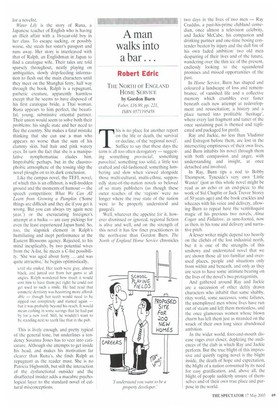A man walks into a bar .
Robert Edric
THE NORTH OF ENGLAND HOME SERVICE by Gordon Burn Faber, £16.99, pp. 221, ISBN 0571195458 This is no place for another report on the life or death, the survival or decline, of the 'regional novel'. Suffice to say that these days the term is all too often derogatory — suggesting something provincial, something parochial, something too solid, a little too crafted and old-fashioned; something kimbering and slow when viewed alongside those multi-cultural, multi-ethnic, supposedly state-of-the-nation novels so beloved of so many publishers (as though these outer reaches of the 'regions' were no longer where the true state of the nation were to be properly understood and gauged).
Well, whatever the appetite for it, however dismissed or ignored, regional fiction is alive and well, and on the strength of this novel it has few finer practitioners in the north-east than Gordon Burn. The North of England Home Service chronicles
two days in the lives of two men — Ray Cruddas, a past-his-prime clubland comedian, once almost a television celebrity, and Jackie McCabe, his companion and drinking partner and one-time boxing contender beaten by injury and the dull fire of his own faded ambition: two old men despairing of their lives and of the future, wandering over the thin ice of the present, endlessly looking to the squandered promises and missed opportunities of the past.
In Home Service, Burn has shaped and coloured a landscape of loss and remembrance, of vanished life and a collective memory which crumbles ever faster beneath each new attempt at redevelopment and resuscitation; a history and a place turned into profitable 'heritage', where every last fragment and tatter of the once sustaining past is themed and replicated and packaged for profit.
Ray and Jackie, no less than Vladimir and Estragon before them, are lost in the intersecting emptinesses of their own lives, and Burn inhabits his novel through them with both compassion and anger, with understanding and insight, at once detached and involved.
In Ray, Burn tips a nod to Bobby Thompson, Tyneside's very own 'Little Waster' (just as this whole novel might be read as an echo or an end-piece to the work of Sid Chaplin or Jack Trevor Storey of 50 years ago) and the book crackles and wheezes with his voice and delivery, allowing Burn to repeat here the ventriloquist magic of his previous two novels, Alma Cogan and Fullalove, as sure-footed, now as then, in his tone and delivery and narrative pitch.
A lesser writer might depend too heavily on the clichés of the lost industrial north, but it is one of the strengths of this unshowy and understated novel that we are shown those all too familiar and overused places, people and situations only from within and beneath, and only as they are seen to have some intimate bearing on the lives of the novel's two protagonists.
And gathered around Ray and Jackie are a succession of other deftly drawn characters who inhabit that same shabby, ritzy world, some successes, some failures, the unemployed men whose lives have run out of steam and left them motionless, and the once glamorous women whose blown charm has left them just as stranded on the wrack of their own long since abandoned ambition.
In the wider world, foot-and-mouth disease rages ever closer, depleting the audiences of the club in which Ray and Jackie perform. But the true blight of this impressive and quietly raging novel is the blight inside, the death of hope and expectation, the blight of a nation consumed by its need for easy gratification, and, above all, the blight of people suddenly unsure of themselves and of their own true place and purpose in the world.


































































































 Previous page
Previous page